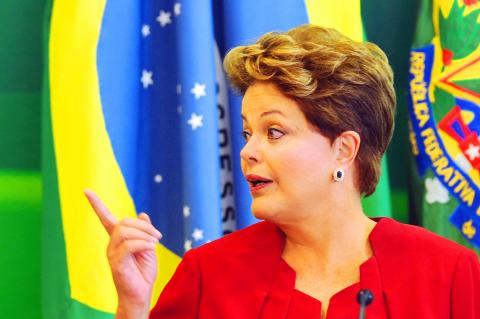Brazil’s government has proposed changes to a fiscal responsibility law that set the foundation for a decade of economic prosperity in Latin America’s largest economy, two local newspapers said on Saturday.
The changes would make it easier for the government to cut Brazil’s high tax burden and enact other stimulus measures after two years of slow economic growth, but they could also rattle investors who fear Brazilian President Dilma Rousseff has been too quick to modify bedrock economic principles.
Changing part of the law enacted in 2000 would remove “the shackles of economic policy,” an unnamed source from the finance ministry told Estado de Sao Paulo newspaper.

Photo: AFP
A finance ministry spokesman did not respond to an e-mailed request for comment.
FISCAL REFORM
Rousseff’s economic team included the proposed changes in a bill aimed at fiscal reform at the state level on Friday, the newspapers said.
That day, the government also posted a deficit of 5.5 billion reais (US$2.7 billion) for last month, jeopardizing its ability to meet a closely watched annual fiscal target.
The government needs to post a primary surplus of 31.5 billion reais this month to meet the target, and on Friday passed a decree that would allow it to dip into its sovereign wealth fund if tax income is lower than expected this month.
Rousseff has dished out tax breaks and intervened in state-run companies to cut electricity costs as she tries to boost growth, but the measures have dragged down government revenues.
The fiscal responsibility law put an end to a series of financial crises that rocked Brazil in the 1980s and 1990s.
Brazil’s finances are much more solid now, but any change to the text could unsettle investors.
At the same time her commitment to fiscal responsibility is being questioned, Rousseff has been under pressure to make even deeper structural reforms since economic growth slowed to a mere 0.6 percent in the third quarter of this year.
CRITICISM
Those efforts have drawn criticism from the TCU, a government agency that audits public spending, according to stories in Folha de Sao Paulo and Estado de Sao Paulo newspapers on Saturday.
The government believes altering the fiscal responsibility law would remove such constraints. Congress will consider the proposal after February, the papers said.
Despite slow growth and the increasingly unlikely fiscal target, many aspects of Brazil’s economy still seem healthy compared to much of the developed world.
Unemployment remains near a record low, the debt to GDP ratio has fallen below that of the US and many European economies, and Rousseff is popular among voters who believe the economy will eventually improve.

PATENTS: MediaTek Inc said it would not comment on ongoing legal cases, but does not expect the legal action by Huawei to affect its business operations Smartphone integrated chips designer MediaTek Inc (聯發科) on Friday said that a lawsuit filed by Chinese smartphone brand Huawei Technologies Co (華為) over alleged patent infringements would have little impact on its operations. In an announcement posted on the Taiwan Stock Exchange, MediaTek said that it would not comment on an ongoing legal case. However, the company said that Huawei’s legal action would have little impact on its operations. MediaTek’s statement came after China-based PRIP Research said on Thursday that Huawei filed a lawsuit with a Chinese district court claiming that MediaTek infringed on its patents. The infringement mentioned in the lawsuit likely involved

Taipei is today suspending work, classes and its US$2.4 trillion stock market as Typhoon Gaemi approaches Taiwan with strong winds and heavy rain. The nation is not conducting securities, currency or fixed income trading, statements from its stock and currency exchanges said. Authorities had yesterday issued a warning that the storm could affect people on land and canceled some ship crossings and domestic flights. Taiwan Semiconductor Manufacturing Co (TSMC, 台積電) expects its local chipmaking fabs to maintain normal production, the company said in an e-mailed statement. The main chipmaker for Apple Inc and Nvidia Corp said it has activated routine typhoon alert

GROWTH: TSMC increased its projected revenue growth for this year to more than 25 percent, citing stronger-than-expected demand for AI devices and smartphones The Taiwan Institute of Economic Research (TIER, 台灣經濟研究院) yesterday raised its forecast for Taiwan’s GDP growth this year from 3.29 percent to 3.85 percent, as exports and private investment recovered faster than it predicted three months ago. The Taipei-based think tank also expects that Taiwan would see a 8.19 percent increase in exports this year, better than the 7.55 percent it projected in April, as US technology giants spent more money on artificial intelligence (AI) infrastructure and development. “There will be more AI servers going forward, but it remains to be seen if the momentum would extend to personal computers, smartphones and

Catastrophic computer outages caused by a software update from one company have once again exposed the dangers of global technological dependence on a handful of players, experts said on Friday. A flawed update sent out by the little-known security firm CrowdStrike Holdings Inc brought airlines, TV stations and myriad other aspects of daily life to a standstill. The outages affected companies or individuals that use CrowdStrike on the Microsoft Inc’s Windows platform. When they applied the update, the incompatible software crashed computers into a frozen state known as the “blue screen of death.” “Today CrowdStrike has become a household name, but not in